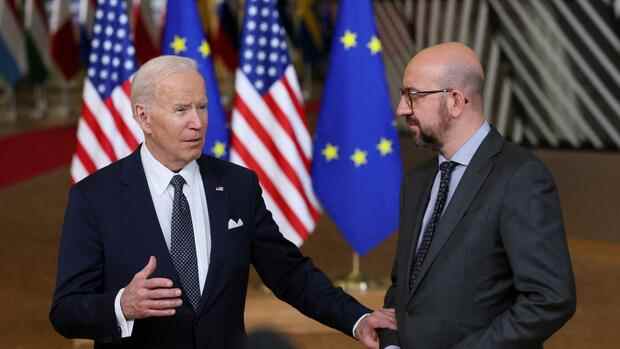Brussels The EU and the USA want to move closer together economically in order to make themselves less susceptible to blackmail from authoritarian states such as China or Russia. At the deliberations of the Transatlantic Trade and Technology Council (TTC) in Paris next week, both sides want to decide on measures to strengthen the security of supply, for example in solar technology, wind power and critical raw materials.
At the same time, the US government and the EU Commission are promising comprehensive trade facilitation for Ukraine, with which they want to support the country’s reconstruction. This is based on the current draft of the final declaration for the TTC, dated May 7th. It is available to the Handelsblatt.
“As recent events have shown, strong transatlantic ties and cooperation on trade, technology and security are more important than ever,” the document said. Russia’s aggression against Ukraine has resulted in “the gravest violations of international humanitarian and human rights law on the European continent in over 70 years”.
Americans and Europeans pledge their “unwavering support” to Ukraine and stress the importance of deepening trade ties to “mitigate the devastation caused by Russian military aggression and strengthen Ukraine’s economy against future Russian economic aggression.”
Top jobs of the day
Find the best jobs now and
be notified by email.
Specifically, the EU and the US promise “the temporary abolition of quotas and import tariffs”. Brussels and Washington even want to suspend measures to compensate for price dumping for Ukraine. Two weeks ago, the EU Commission proposed to the member states and the EU Parliament to abolish all trade barriers for Ukraine for a year. Now the Americans are ready to take a similar step.
For the US administration of President Joe Biden, the TTC is the most important forum for transatlantic cooperation. Washington is pursuing the strategic goal of overcoming the old model of globalization, which was shaped by the concept of “change through trade”. The Americans want to pay more attention to the political reliability of technology suppliers and trading partners. The exchange between democracies is to be strengthened, economic relations with authoritarian powers are to be reviewed.
At first the Europeans were skeptical. However, the dependency on Russian oil and gas supplies has made it clear how real the threat of economic blackmail is. What Russian energy resources are today could be high-tech from China in the next conflict. There is a risk of dangerous dependencies, especially in the area of green, i.e. climate-friendly, technologies – and the EU and the USA now want to reduce these together.
Huge investments in solar systems required
The transatlantic partners identify a “severe supply concentration and market bottlenecks” in the solar sector that posed “a risk to energy security”. According to the document, photovoltaics is the cheapest form of newly installed energy for two-thirds of the world’s population.
Both in the EU and the United States Huge investments in solar systems are necessary for climate protection. Europeans and Americans want to use this type of energy production to reduce dependence on China: “This unprecedented growth in demand offers opportunities to diversify segments of the supply chain that are currently most commercially and geographically concentrated, namely the stages of ingot, wafer and cell fabrication,” they write.
The US emphasizes that it is promoting the Indian solar industry while making efforts to strengthen domestic production. They also refer to a law that is directed against the exploitation of the Uyghur minority in China and bans the import of goods and raw materials from the Uyghur province of Xinjiang, an important location for the Chinese solar industry, to the USA.
There is a risk of a dangerous dependency on China in the solar sector.
(Photo: AP)
The EU is leading the European supply chain law, which obliges companies to ensure that their foreign business partners protect elementary human rights. Products based on forced labor should no longer be allowed to be sold in Europe. At the same time, the EU and the USA pledge that they will not weaken their solar industries with protectionist hurdles.
Another area where the EU and the US want to strengthen their technological independence from China is the mining and processing of rare earths – minerals that are needed to make magnets, without which wind turbines, electric cars and cell phones don’t work. So far, Europeans and Americans have depended almost entirely on imports.
“Almost all stages of production are concentrated in China,” the joint statement said. China accounted for nearly 60 percent of total rare earth production in 2020, an estimated 89 percent of total rare earth separation capacity, and an estimated 90 percent of total metals processing capacity.
More Handelsblatt articles on international cooperation:
The EU and the US want to agree on joint “responsible investments” in the Promote rare earth mining, working with countries like Japan, Australia and Canada. They also want to strengthen the circular economy and improve recycling processes.
From the point of view of both sides, the TTC has already proven its worth: in the weeks before the start of the war, the EU and the USA worked closely together in preparing their sanctions against Russia and coordinated export controls for western cutting-edge technology on which the Russian defense industry depends.
Tyson Barker from the German Council on Foreign Relations praises the current US administration. The Biden government has invested more in the EU as a system partner than any of its predecessors. He also sees the new plans positively: “It’s about geopolitics – plain and simple.”
More: Joe Biden has found his role: as Europe’s best man
